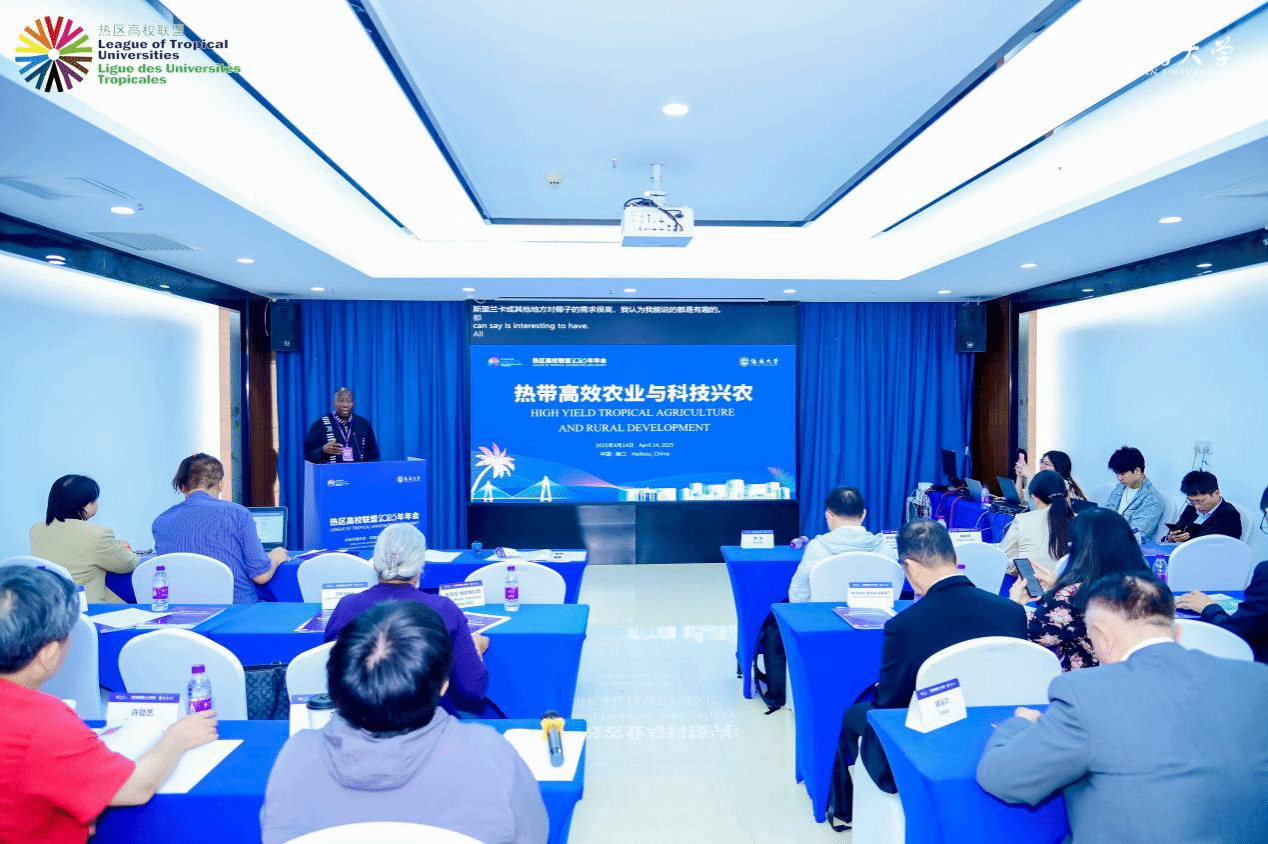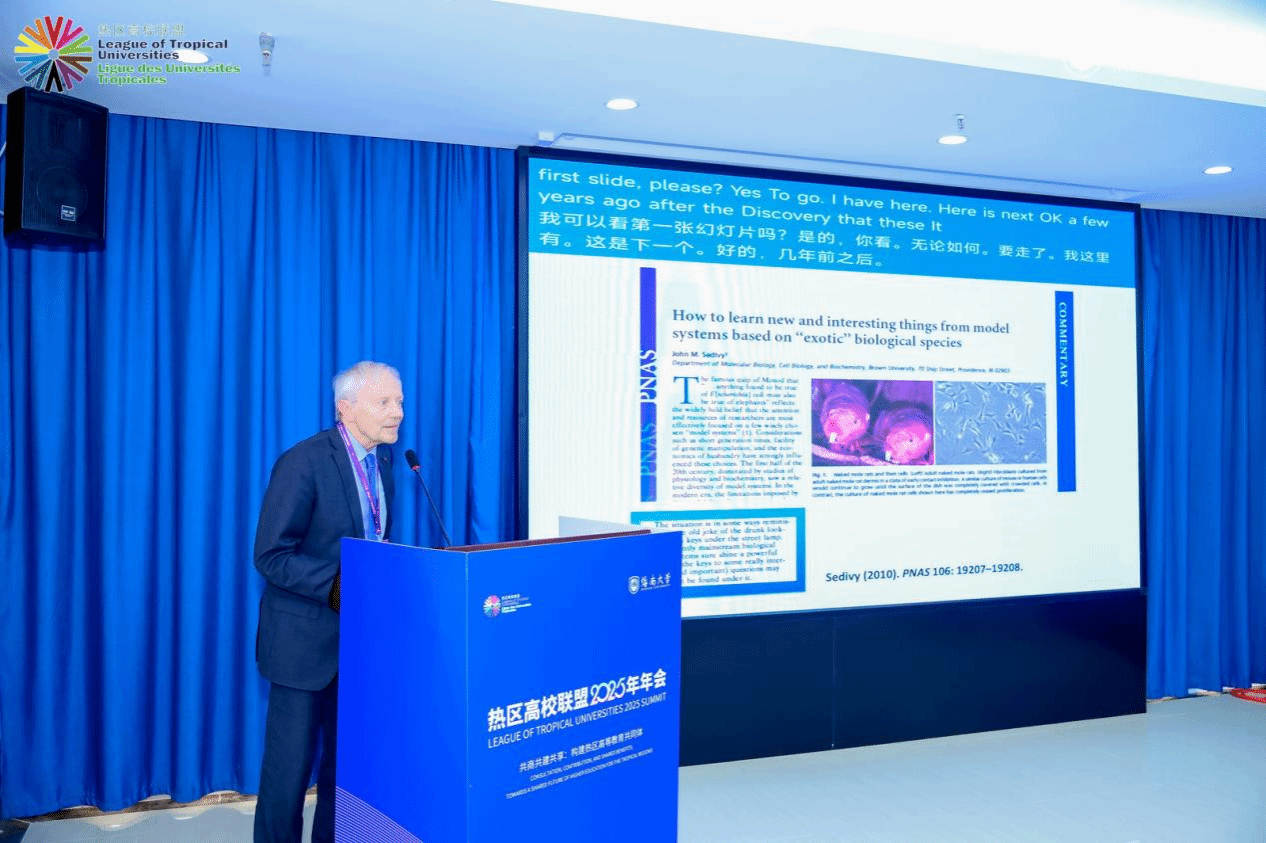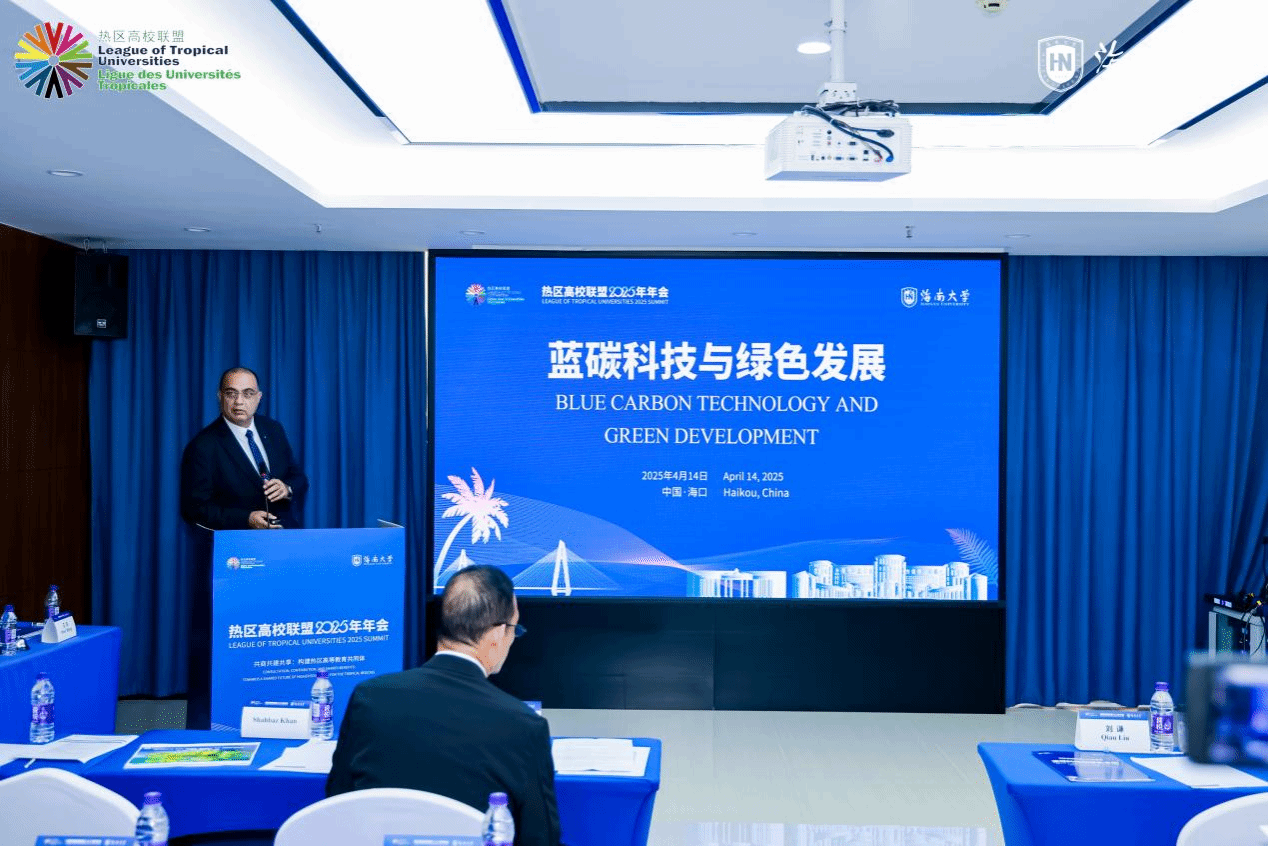The League of Tropical Universities (LTU) 2025 Summit continued in full swing as four parallel sessions were held on the afternoon of April 14 at the Hainan University (HNU) International Academic Exchange Center. Themed “High-Efficiency Tropical Agriculture and Rural Development”, “One Health and Tropical Diseases Prevention & Control”, “Mutual Learning among Civilizations and Digital Humanities”, and “Blue Carbon Technology and Green Development” respectively, the four sessions brought together representatives from 49 LTU member institutions across 26 countries and regions, alongside delegates from 107 government bodies, international organizations, universities, and research institutions committed to advancing education and sustainability in tropical regions. Distinguished attendees at the sessions included Datuk Ahmad Parveez, Director-General of the Malaysian Palm Oil Board (MPOB); Suon Serey, Undersecretary of State of the Ministry of Agriculture, Forestry and Fisheries of Cambodia; Shahbaz Khan, Director of the UNESCO Office in Beijing; Mihoko Kumamoto, Director of the Division for Prosperity at the United Nations Institute for Training and Research (UNITAR); Felix Dapare Dakora, former President of the African Academy of Sciences and Foreign Member of the Chinese Academy of Engineering (CAE); Nils Chr. Stenseth, Foreign Member of the Chinese Academy of Sciences (CAS) and Professor at the University of Oslo; and Yvon Le Maho, Member of the French Academy of Sciences and the European Academy of Sciences.
In line with the unique geographic conditions of tropical regions, the parallel session on “High-efficiency Tropical Agriculture and Rural Development” brought together experts to exchange insights on sustainable development, climate resilience, and biotech applications. Prof. Felix Dapare Dakora warned of the growing impact of climate change on African agriculture and called for localized talent development as a path forward. Datuk Ahmad Parveez shared Malaysia’s experience in implementing the MSPO — the world’s first mandatory sustainable palm oil certification scheme — to guide the green transformation of the industry. Lively discussions followed on biotech applications and climate-resilient agriculture (CRA), with participants mapping out development strategies for sustainable tropical agriculture.

Parallel session on “High-efficiency Tropical Agriculture and Rural Development” (Photo courtesy of the Publicity Department)
The parallel session on “One Health and Tropical Diseases Prevention & Control” highlighted the importance of cross-disciplinary collaboration in addressing zoonotic diseases and public health challenges driven by climate change in tropical regions. The Session emphasized the need for integrated human-animal-environment approaches to disease prevention and control. Prof. Nils Chr. Stenseth presented findings from interdisciplinary research on the ecological drivers of plague transmission, offering new insights into global early warning and prevention strategies. Prof. Zhang Zhibin from HNU’s School of Ecology shared practical applications of the One Health framework in zoonotic disease control, underscoring the value of multidisciplinary cooperation and coordinated response. Participants had an in-depth exchange of views on the theoretical foundations, technological solutions, and practical applications of the One Health framework in tropical disease prevention and control.

Parallel session on “One Health and Tropical Diseases Prevention & Control”
(Photo courtesy of the Publicity Department)
The parallel session on “Mutual Learning among Civilizations and Digital Humanities” responded to the Global Civilization Initiative by exploring how digital technology can revitalize cultural heritage in tropical regions. It highlighted the dual role of digital tools in preserving cultural diversity and empowering the humanities research, while advancing cross-cultural knowledge sharing. Prof. Cheng Zhimin from HNU’s School of Humanities examined the unique identity of “South China Sea Civilization” through the lens of historical geography and geopolitics, advocating for a shift beyond the traditional “Mediterranean paradigm” toward a civilization-state framework for regional cultural exchange. Prof. Gao Chang, a UNESCO advisor and anthropologist, reflected on African cultural expression from the perspectives of colonial legacy and cultural revival, calling for international attention to its contemporary forms. Prof. I Lo-fen from Nanyang Technological University (NTU) explored the global dissemination of Su Dongpo’s works and the application of artificial intelligence (AI), showcasing the convergence of classical humanities and emerging technologies.

Parallel session on “Mutual Learning among Civilizations and Digital Humanities” (Photo courtesy of the Publicity Department)
The parallel session on “Blue Carbon Technology and Green Development” focused on driving the low-carbon transition of the ocean economy and supporting tropical countries in achieving both food security and sustainable growth. Prof. Kao Shuh-Ji, Director of the State Key Laboratory of Marine Resource Utilization in South China Sea (MRU), emphasized the limited but vital role of blue carbon as recognized by the Intergovernmental Panel on Climate Change (IPCC). He noted that meeting China’s dual carbon goals (peaking emissions before 2030 and achieving carbon neutrality before 2060) will require identifying new carbon sinks across vast marine spaces—while also balancing ecological integrity, environmental quality, and climate security. Associate Prof. Cui Ying from Montclair State University shared her research which employs nitrogen isotopes and Earth system modeling to quantify ocean nutrient cycling and carbon sequestration potential, concluding that microbial efficiency can contribute to—but not substitute for—active emission reduction. Prof. Moritz Müller from Swinburne University of Technology (Sarawak) made a presentation on the mangrove forests and ecology-related services in Malaysia’s Sarawak and Sabah. Participants further interacted on international cooperation, innovation-driven solutions, biodiversity conservation, climate risk management, and the prospects for marine carbon neutrality and carbon storage.

Parallel session on “Blue Carbon Technology and Green Development”
(Photo courtesy of the Publicity Department)
HNU Vice Presidents Cao Bing, Gao Diangong, Liu Qian, and Li Buhong attended the sessions, together with the heads of relevant departments and faculty and student representatives.
Translated by Han Yunsheng
Proofread by Kuang Xiaowen, Yang Jie